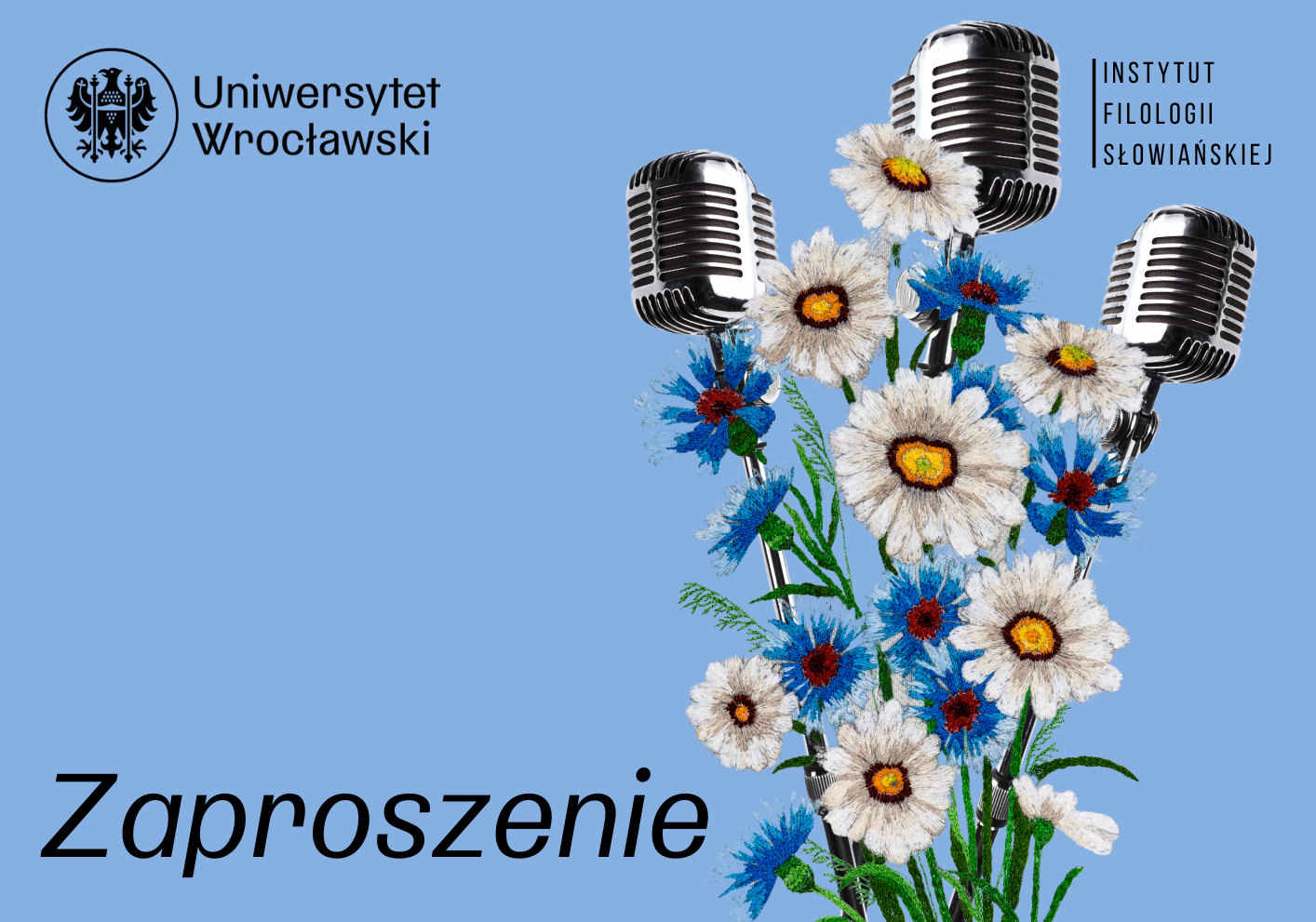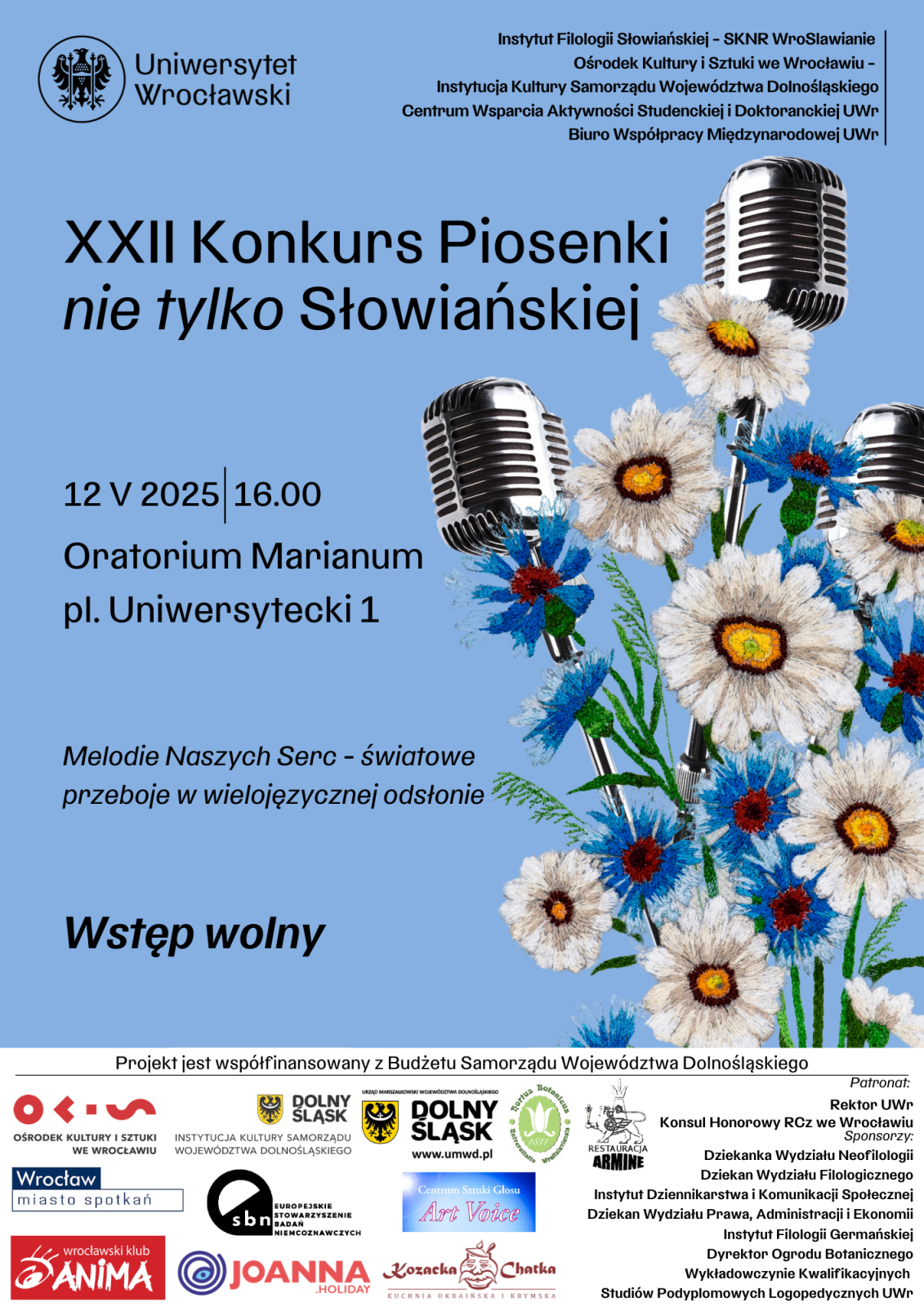
The 22nd Non-Slavic Song Contest is today!
World hits in a multilingual setting will be presented to the audience by the participants of the 22nd edition of the Non-Slavic Song Contest, which will take place on 12th May at 4 p.m. in the Oratorium Marianum.
The current Slavic and Beyond Song Contest was initially held as a Slavic Song Contest competition for its first twenty editions. Organised by the Institute of Slavic Studies, it primarily promoted the languages taught within the department — Czech, Croatian, Serbian, Russian, and Ukrainian. At the time, the Rector of the University of Wrocław awarded prestigious prizes, including semester-long study trips to Croatia, the Czech Republic, Russia (Moscow and Siberia), and Ukraine. Over time, however, two significant changes occurred: first, the political landscape shifted; second, the rise of numerous academic mobility programmes — not just Erasmus+ — gradually diminished the appeal and relevance of these prizes. During the 20th anniversary edition, the organisers announced a new chapter for the competition. From the 21st edition onwards, all students and doctoral candidates — regardless of their university affiliation — could participate, performing songs in any language, including Polish.
This year’s 22nd edition of the Non-Slavic Song Contest will showcase hits in English, Albanian, Spanish, Hindi, Crimean Tatar, Italian, French, and other languages. Slavic languages will only be heard outside the competition during the jury’s deliberations.
The competition is organized by the Student Scientific Accociation of Russian Studies “WroSlawianie” of the Institute of Slavic Studies, the Wrocław Centre for Culture and Art, the International Office at the University of Wrocław, and the Student and Doctoral Activity Support Section at the University of Wrocław.
The event is held under the patronage of the Rector of the University of Wrocław, prof. Robert Olkiewicz, and the Honorary Consul of the Czech Republic in Wrocław, Mr. Arkadiusz Ignasiak.
The competition will be opened by the UniSon band, composed of French and Polish Studies students. They made their debut at the Gramy dla Sebastiana (eng. Playing for Sebastian) benefit concert. Grzegorz Marekwica, a third-year French Studies student, is the founder, accompanist, and driving force behind the ensemble. UniSon will perform l’Oiseau et L’Enfant from the repertoire of the pop band Kids United.
Adrianna Kwiatkowska, a previous winner of the Slavic Song Contest, a student of German language and literature, a graduate of the Capitol Musical Studio, and a musical theater actress, will perform Gloria Gaynor’s iconic hit I Will Survive. Meanwhile, Lalita Czekanowska, a student of Indian philology, will sing the Hindi version of Céline Dion’s My Heart Will Go On.
Two years ago, Kamila Ogrodnik, a graduate of Czech and Russian Studies, performed Anna German’s famous song Eurydyki tańczące (eng. Dancing Eurydyki) at the Melodies of Three Generations concert. This time, Zuzanna Złotnicka, a student of Polish Studies, will tackle this challenging piece. Zuzanna, who has been singing at the FART Song and Dance Studio in Bielawa for eight years, will be accompanied by her brother Grzegorz on the piano.
Kejti Kabello, a biotechnology student from Albania, is well-versed in the Albanian music scene. She has performed and won numerous awards, singing and playing, taking on both lead and supporting roles in various musicals. She is currently a member of the UniOrchestra at the UWr. Kejti will be performing Enderr / Dream, a piece by the legendary Albanian musician Agron Berisha.
Lea Wiegand, a third-year French Studies student at the Institute of Romane Studies, won last year’s 21st edition of the Slavic Song Contest. The main prize was presented to her by the then Dean of the Faculty of Letters, the current Rector of the University of Wrocław, prof. Arkadiusz Lewicki. This time, Lea will perform the song Nella Fantasia, with music composed by Ennio Morricone and lyrics by Chiara Ferraù. The melody is inspired by the theme of Gabriel’s Oboe from the film The Mission.
Kalina Filus, a computer science student at the UWr, received an honorable mention at the 20th Slavic Song Contest. She regularly showcases her original work at poetry evenings organized by the Nomen Omen team. This time, she will perform a cover of Kayah & Bregović’s Rožica sem bila/Kiedyś byłam różą (eng. When I Was a Rose) in both Polish and Croatian.
The well-known hit from Adele’s repertoire, All I Ask, will be performed by Sara Kicińska, a third-year psychology student at the UWr. Sara is an experienced singer, a winner of numerous music festivals, and a passionate jazz, gospel, and classical music fan.
Paulina Maślanka, a Croatian Studies student from the Institute of Slavic Studies and an accomplished stage performer, will present a song by Severina, one of the most popular singers in Croatia, entitled Tako ti je, sine moja. This will be Paulina’s debut performance on the stage of the Oratory Marianum.
Natalia Grosiak (a Czech Studies graduate from the Institute of Slavic Studies) with the band Mikromusic performed as a star in one of the first editions of the Slavic Song Contest. Twenty years later, one of the band’s most popular songs, Takiego chłopaka (eng. Such a Boy), will be performed by Anna Słupek, a first-year speech therapy student. Anna has previously performed recitals with her own material, and two years ago, under the pseudonym Limonart, she released the album Znowu Zielone (eng. Green Again) on streaming platforms, featuring her self-composed tracks.
The band Zgranic, featuring singer Weronika Wąsowska, consists of exceptionally talented students from the University of Wrocław, the University of Economics, and the University of Life Sciences. Each member of this newly formed ensemble has won numerous national and international competitions, collaborated with various bands from Wrocław, performed in philharmonic orchestras, and much more. They will present to our audience the iconic hit Człowieczy los. (eng. Human Fate) by Anna German.In contrast to the newly formed band Zgranic, Zofia Popławska, a graduate of the Institute of Journalism and Social Communication at the University of Wrocław, is well-known among lovers of non-Slavic songs. She has performed multiple times on the Oratorium stage, winning prestigious awards and participating in the October editions of the Melodie Trzech Pokoleń (eng. Melodies of Three Generations) concerts. She has sung songs in Ukrainian and English. At this year’s competition, she will perform Lola, a hit from Beata Kozidrak and Bajm’s repertoire.
The winner of the Jubilee Slavic Song Contest, Sofiia Ivanichenko, a native of Ukraine currently studying economics at the Faculty of Law, Administration, and Economics, will sing in Crimean Tatar and English. She will perform the moving and highly relevant song 1944 from the repertoire of Jamala, the Eurovision Song Contest winner nine years ago. Her sister, Hanna, will accompany her on the piano.Natalia Medyńska, a second-year Spanish Studies student, will close the competition with a hit from Monica Urla’s repertoire, titled Nie wie nikt (eng. No One Knows). Natalia translated the chorus into two languages she is closest to – English and Spanish. During her musical journey, she has performed duets with Jacek Cygan and alongside Krystyna Prońko. Last year, she took part in the fifth edition of the Melodie Trzech Pokoleń (eng. Melodies of Three Generations) concert, where, together with Danuta Korkus, she performed a joint composition based on the sonnet “Soneto de la dulce queja,” winning both the first prize and the audience award at the seventh edition of the Panorama Piosenki Romańskiej (eng. Panorama of Romanian Song).
In addition to the main prizes and honorable mentions, all participants will compete for the Audience Award. The applause of the people gathered in the Oratorium Marianum will determine the prize awarded by the audience. During the jury deliberations, performances are traditionally given by graduates of the Institute of Slavic Studies, past contest winners, lecturers, and invited guests.
Our graduates will revisit some of the greatest hits in Slavic languages — including the Czech classic Já půjdu tam a ty tam by Helena Vondráčková and Jiří Korn, performed by Kamila Ogrodnik and friends; the touching Ukrainian piece Троянди на пероні, performed by Luba Moc; and a generational anthem for those born in the early 1990s, She, by the rock band Lament Jeremiah, sung by Ukrainian Studies graduate Marcin Kluzek. The energetic band PRYPADOK, featuring the Institute of Slavic Studies graduate Natalia Ciołka, will perform an equally energetic Ukrainian piece titled Parowa maszyna (eng. Steam Machine), sung in harmony.
The Serbian and Ukrainian Studies graduate Pavel Loboda and friends will perform Czesław Niemen’s greatest hit Dziwny jest ten świat (Strange Is This World) in Belarusian. Regular performers Martyna Duńska, Klaudia Wyglądacz, Igor Jelinek, and Stanislav Marinchenko are still working on the songs they plan to present to the Wrocław audience.
The 22nd edition of the Non-Slavic Song Contest is organized by the Student Scientific Accociation of Russian Studies “WroSlawianie”, under the supervision of dr Katarzyna Martyniuk.
Nina Kownacka, a second-year Russian Studies student currently on an Erasmus exchange in Turkey, designed the posters, invitations, and diplomas.
We invite you on May 12, 4 p.m. to Oratorium Marianum
Wiesława Zybura
Translated by Zuzanna Sobkowiak (student of English Studies at the University of Wrocław) as part of the translation practice.

Date of publication: 5.05.2025
Added by: M.K.



